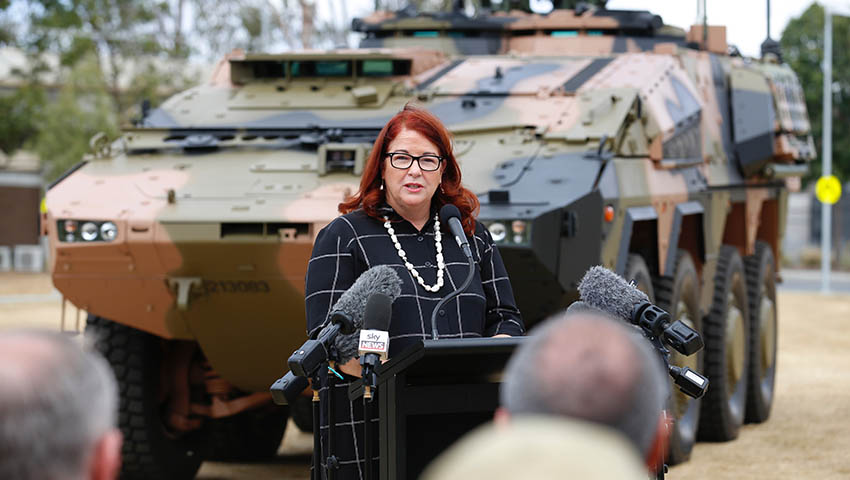As the world comes to grips with the economic, political and strategic impact of COVID-19, the opportunities it presents Australia’s sovereign defence industry are too big to be ignored, explains Defence Industry Minister Melissa Price.
To continue reading the rest of this article, please log in.
Create free account to get unlimited news articles and more!
Like never before, this global pandemic has provided a sharp reminder of the importance of self-reliance and sovereignty in Australia’s defence industry. In this brave new world, we have two big priorities: a stronger defence, and building a new era of Australian-made capability.
Which is why last week’s announcement of the 2020 Defence Strategic Update was so important. It cemented Australian industry’s role in delivering the defence capability we need.
And while our changing global environment has resulted in a significant shift in Australia’s defence strategy, we’ve benefited from the groundwork we began laying four years ago.
Perhaps many Australians haven’t seen it yet, but the growth of our Australian defence manufacturing base has been remarkable. They are delivering world-class products on the international stage.
But they must do more if we are truly to be a sovereign industrial nation.
Few could have predicted the situation we are now facing, but we’ve been building momentum in our defence industry since 2016. And it is that momentum which has kept the wheels turning over the past few months.
Since late March, we have been getting cash out the door faster to Australian small businesses. We have saved thousands of Australian jobs.
We’ve done this by paying some 110,000 invoices valued at $9 billion. Of this, $7 billion has been paid early.
Since the release of the 2016 White Paper, the government has made 400 individual project decisions.
Our naval shipbuilding plan is massive in scale. Not buying these huge assets offshore will literally deliver a generation of jobs, as well as build local know-how. In what is the largest regeneration of the Navy since the Second World War, we’ll see some 70 vessels being built right here in Australia. Australian workers, Australian steel, Australian know-how.
In addition, we’re revolutionising Army’s fleet of infantry fighting vehicles. Our $20 billion investment in the LAND 400 program is already encouraging Australian manufacturers to diversify and take up opportunities in the nationwide supply chain.
Australia’s involvement in the Global F-35 Program is not only delivering world-leading capability for our Royal Australian Air Force, but is providing $1.7 billion worth of work for more than 50 of our local companies.
This is the key priority for me, and for our government – now more than ever. These investments are creating jobs and opportunities for small business right across Australia.
One of our leading industry partners, Thales, recently completed detailed economic analysis to determine how the government’s defence industry investments flow through the national economy.
It’s the first time one of Australia’s major defence contractors has dug into their supply chain in such detail.
What it revealed was that our spending on Defence projects is overwhelmingly flowing through the supply chain and to the industry’s small businesses right around Australia.
Thales spent $1.3 billion with Australian suppliers between 2017 and 2019, with more than 60 per cent of that amount going to small- and medium-sized businesses. Their analysis concluded the spending directly supported 1,765 Australian jobs in 2019.
I’m upfront with our major Defence contractors. They have an obligation to support Australian industry. COVID-19 has taught the majors the value of Australian-made.
But the major contractors are working with Australian businesses not just because they’re obliged to. Repeatedly, I’ve seen examples of small Australian businesses developing technology and capability that is absolutely world-leading.
In the past 12 months, we’ve seen a maturing and strengthening of key sectors as we move into the delivery phase of some of our major acquisition projects, and crucial design phases of others.
Our government’s $270 billion investment in defence capability is already benefiting some 15,000 businesses and supporting around 70,000 workers. I want to grow those numbers.
We’ve announced new opportunities for Australian industry in cyber, autonomous systems, artificial intelligence, radar, communications, and space-based capabilities and sensors.
Our $7 billion investment in space represents an enormous opportunity for Australian industry. It might surprise people to know there are companies right across Australia, many of them small businesses, looking at ways to increase our space technologies.
Businesses like Gilmour Space Technologies on the Gold Coast are working with Defence to develop lower-cost, reliable and dedicated rockets to launch small satellites into low-Earth orbits.
Whether it’s rockets, radars or rivets, Australian defence businesses are succeeding. They have stepped up. But military precision is required to ensure that Australia has sovereign industrial capability.
Melissa Price is the Minister for Defence Industry and the federal member for the WA seat of Durack.

 Login
Login







